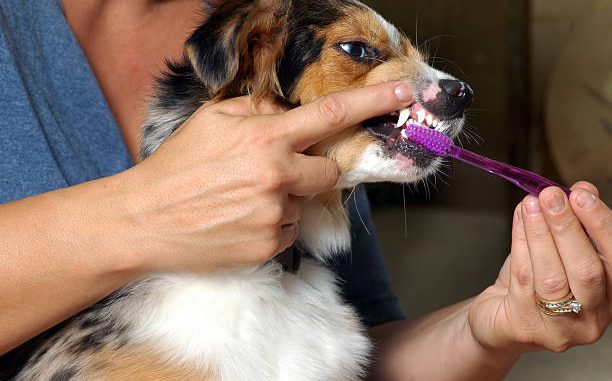
Maintaining proper dog oral hygiene is more than just a matter of fresh breath; it’s crucial for their overall health and well-being. Just like humans, dogs can suffer from dental issues such as plaque buildup, gum disease, and tooth decay. Neglecting oral care can lead to discomfort, pain, and even more severe health problems. To ensure your furry friend’s dental health remains in top shape, here are some essential tips to follow:
Brushing Your Dog’s Teeth: Tips for Establishing a Dental Care Routine
Brushing your dog’s teeth is one of the most effective ways to maintain their oral hygiene. Start by introducing tooth brushing gradually, using a soft-bristled toothbrush and dog-friendly toothpaste. Choose a time when your dog is relaxed, and begin by gently massaging their gums with your finger to get them used to the sensation. Gradually introduce the toothbrush, focusing on the outer surfaces of their teeth in small circular motions. Aim to brush your dog’s teeth at least 2-3 times a week to remove plaque and prevent tartar buildup.
Dental Chews and Treats: Supplemental Options for Oral Health Maintenance
In addition to regular brushing, dental chews and treats can be valuable supplements to your dog’s oral hygiene routine. These products are specifically designed to promote dental health by reducing plaque and tartar buildup, freshening breath, and massaging gums. Look for dental chews that carry the Veterinary Oral Health Council (VOHC) seal, indicating they meet specific standards for effectiveness in reducing plaque and tartar. However, it’s important to use these treats in moderation and as part of a comprehensive dental care plan.
Professional Dental Cleanings: When and Why They’re Necessary for Dogs
Even with regular brushing and the use of dental chews, professional dental cleanings by a veterinarian are sometimes necessary to maintain optimal oral health for your dog. Your vet can assess your dog’s dental health during routine check-ups and recommend professional cleanings as needed. These cleanings involve scaling to remove plaque and tartar buildup, polishing to smooth the tooth surface, and sometimes extractions if necessary. Professional dental cleanings not only address existing dental issues but also help prevent future complications, ensuring your dog’s oral health.
Signs of Dental Problems: Recognizing Symptoms and Seeking Veterinary Care
It’s essential to be vigilant for signs of dental problems in your dog and seek veterinary care if you notice any concerning symptoms. Common signs of dental issues include bad breath, swollen or bleeding gums, difficulty chewing, pawing at the mouth, and loose or missing teeth. Additionally, changes in appetite or behavior, such as increased irritability or reluctance to play may indicate dental pain. Prompt veterinary attention can help diagnose and address dental problems early, preventing further complications and ensuring your dog’s comfort and well-being.

Healthy Diet
A balanced diet not only benefits your dog’s overall health but also contributes to their dental hygiene. Provide your dog with quality dog food and avoid excessive treats and table scraps, which can contribute to dental issues. Additionally, certain dental diets and treats are specifically designed to promote oral health by reducing plaque and tartar buildup.
ALSO READ: Top 5 Dog Collars of 2024: Stylish & Functional Options for Every Pup
Dental Chews and Toys
Chewing is a natural behavior for dogs and can help maintain their dental health. Provide your dog with dental chews and toys designed to promote chewing and reduce plaque buildup. Look for products endorsed by the Veterinary Oral Health Council (VOHC) for their effectiveness in promoting oral hygiene.
Regular Dental Check-ups
Schedule regular dental check-ups with your veterinarian to monitor your dog’s oral health. Your vet can detect dental issues early and provide appropriate treatment. Professional dental cleanings may be necessary to remove stubborn plaque and tartar buildup and prevent more serious dental problems.
Importance of Dog Dental Care: Preventing Dental Disease and Bad Breath
Maintaining proper oral hygiene is essential for your dog’s overall health and well-being. Neglecting dental care can lead to various dental diseases such as periodontal disease, gingivitis, and tooth decay, which can cause pain, discomfort, and even affect your dog’s ability to eat. Moreover, poor oral hygiene can result in foul breath, which can be unpleasant for both you and your furry friend. By prioritizing regular dental care, you can prevent these issues and ensure your dog’s oral health.
By following these guidelines for dog oral hygiene, you can effectively prevent dental disease, maintain fresh breath, and promote your furry friend’s overall health and happiness. Remember, consistent dental care is key to ensuring your dog’s lifelong oral health and well-being.
Leave a Reply